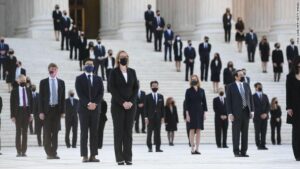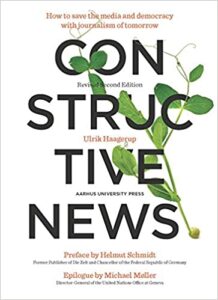Moral responsibility.
October 10, 2020
|
|
|
Dialogue. And listen.
And lead.
Ruth Bader Ginsburg “knew the power of example—that if you live your own life according to your principles, others will follow,” writes her former clerk, Ryan Y. Park, Solicitor General of North Carolina.
The Atlantic
My Friend and Boss, Ruth Bader Ginsburg
“A big deal in the revival of local news: Nonprofit Mountain State Spotlight
Dialoging.
Dr. David Bohm:
“Dialogue is really aimed at going into the whole thought process and changing the way the thought process occurs collectively. We haven’t really paid much attention to thought as a process. We have engaged in thoughts, but we have only paid attention to the content, not to the process.
It is proposed that a form of free dialogue may well be one of the most effective ways of investigating the crisis which faces society, and indeed the whole of human nature and consciousness today. Moreover, it may turn out that such a form of free exchange of ideas and information is of fundamental relevance for transforming culture and freeing it of destructive misinformation, so that creativity can be liberated.”
Leah Garces:
The first lesson I learned is that we have to become comfortable with being uncomfortable. Only talking to people who agree with us, it’s not going to get us to the solution. We have to be willing to enter other people’s space. Because quite often, the enemy has the power to change the problem that we’re trying to solve.
The world’s smallest and biggest problems, they won’t be solved by beating down our enemies but by finding these win-win pathways together. It does require us to let go of that idea of us versus them and realize there’s only one us, all of us, against an unjust system. And it is difficult, and messy, and uncomfortable.
Seth Godin:
The arc and the arch.
They sound similar, but they’re not.
An arc, like an arch, is bent. The strength comes from that bend.
But the arc doesn’t have to be supported at both ends, and the arc is more flexible. The arc can take us to parts unknown, yet it has a trajectory.
An arch, on the other hand, is a solid structure. It’s a bridge that others have already walked over.
Our life is filled with both. We’re trained on arches, encouraged to seek them out.
But an arc, which comes from “arrow,” is the rare ability to take flight and to go further than you or others expected.
HOW TO HAVE A CONVERSATION WITH YOUR POLITICAL OPPONENTS
SANNE BLAUW
This story is from Strangers in Their Own Land by Arlie Hochschild.
‘For this book, the professor emerita of sociology immersed herself in the American political right wing. Over the course of five years, she regularly stayed in ultraconservative “Bayou Country” in Louisiana. She herself comes from lefter than left Berkeley, California. She couldn’t have left her bubble any further behind.
‘When left-wing sociologist Arlie Hochschild went to live in a right-wing stronghold in the American South, she was entering “enemy” territory.
But, by listening to the people there – instead of arguing against them – she distilled a clear picture: right-wing Trump supporters felt like victims of a society that had left them behind.
In an era where debate has descended into a televised shouting match, it’s easy to feel like you’re at war with people who disagree with you.
But Hochschild learned that by laying down our arms and trying to understand, even empathise with, our political opponents, we can learn how to have constructive political conversations.’
You don’t have to agree with political opponents to understand where they’re coming from
‘Having a heart-to-heart conversation with an ideological opponent can feel uncomfortable – unsafe even. But sociologist Arlie Hochschild proves that it pays off. She immersed herself in a conservative stronghold in the Southern United States for five years and wrote a book about it.’
Not everyone agrees with this approach, Hochschild said during a 2016 interview with Ezra Klein. It can feel as though you’re surrendering, laying down your weapons and walking over to the enemy. But, she says: “if you want to compare it to anything, it’s a diplomatic mission. It’s saying: look, we can work this out, let’s see what the basis of that could be”.
Whether it’s about corona, climate or benefits, let’s carry out these diplomatic missions more often. That doesn’t mean you have to agree with each other, but at least you’re making a genuine attempt to understand the other person.’
1976 and 1979: Common Good and Malaise
Prescient words for our current political and social climate. Two steps forward, it seems, 14 steps back. -dayle
Part one of Barbara Jordan’s historic Democratic National Convention keynote speech in 1976. Jordan made history by being the first African American woman to deliver keynote speeches at a Democratic National Convention.
[Every word.]
“I could list the problems which cause people to feel cynical, angry frustrated. Problems which include lack of integrity in government, the feeling that the individual no longer counts, the reality of material and spiritual poverty, the feeling that the grand American experiment is failing. I could recite these problems and then I could sit down and offer no solutions. Americans deserve and want more than a recital of problems.
We are a people in search of our future. We are a people in search of a national community.
Our mistakes were the mistakes of the heart. Let us heed the voice of the people and recognize their common sense. If we do not, we not only blaspheme our political heritage, we ignore the common ties that bid all Americans. Many fear the future. Many are distrustful of their leaders, and believe that their voices are never heard. Many seek only to satisfy their private work…wants. To satisfy their private interest. But this is the great danger America faces,
that we will cease to be one nation and become instead a collection of interest groups: city against suburb, region against region, individual against individual; each seeking to satisfy private wants.
If that happens, who then will speak for America? Who then will speak for the common good? Are we to be one people bound together by common spirit, sharing in a common endeavor; or, will we become a divided nation?
We must not become the new puritans and reject our society. We must address and master the future together.
A national community. This we must do as individuals, and if we do it as individuals, there is not president of the United States that can veto that decision.
- Restore a belief in ourselves.
- Share in the responsibility for upholding the common good.
- Begin again to shape a common future.
For the American idea, though it is shared by all of us, is realized in each one of us.
We as public servants must set an example for the rest of the nation. More is required of public officials than slogans and handshakes and press releases.
A spirit of harmony will survive in American if each of us remembers that we share a common destiny; if each of us remembers, when self-interest and bitterness seem to prevail, that we share a common destiny.
Abraham Lincoln and the concept of a national community.
“As I would not be a slave, so I would not be a master. This expresses my idea of a democracy. Whatever differs from this, to the extent of the difference, is no democracy.”
Historian Jon Meacham, It Was Said:
‘Born in Houston in 1936, shaped by her grandfather’s teachings, as she recalled it, he drilled this lesson into her on Sunday evenings “Just remember the world is not a playground, it’s a school room; life is not a holiday, but an education.” One eternal lesson for us all, to teach us how to love.
A daughter of the segregated south, Barbara Jordan, keynotes the Democratic National Convention of 1976. It was America’s bicentennial, and Jordan was a voice born in one nation speaking to the hopes of a better nation to come.’
https://www.history.com/it-was-said-podcast
Barbara Jordan was the first African American elected to the Texas Senate after Reconstruction and the first Southern African-American woman elected to the United States House of Representatives. [Wikepedia]
Over thirty years ago, July 15th, 1979, Jimmy Carter gave his famous “malaise speech,” in which the president said the country’s economic woes were in part due to a “crisis of confidence.”
Full audio speech:
https://millercenter.org/the-presidency/presidential-speeches/july-15-1979-crisis-confidence-speech







